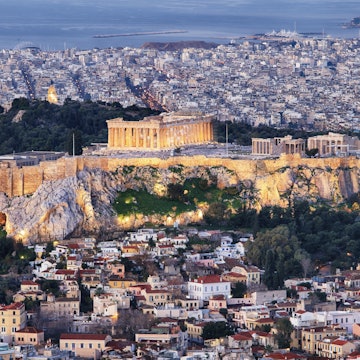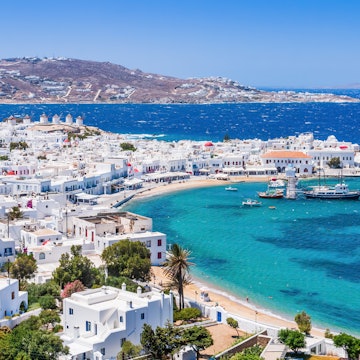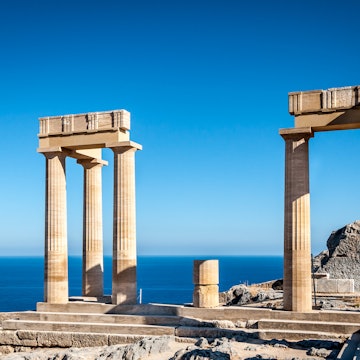

Paleokastritsa beach on Corfu. Milos Vucicevic/Shutterstock
Corfu was one of the first mainstream Greek vacation destinations, and it remains one of the most popular.
Surrounded by the turquoise waters of the Ionian sea, the island has a long and rich history and boasts impeccable architecture – with Venetian, French and British influences – lush greenery, a versatile coastline with world-class beaches, delectable cuisine, vibrant nightlife, and kind-hearted, music-loving locals.
Plan your visit with our first-timer's guide to Corfu.
How much time should I spend on Corfu?
Whether you can only spend a long weekend on Corfu, or you're here for a full two-week vacation, you're guaranteed a rewarding stay.
The Old Town, a UNESCO World Heritage Site, is the perfect base if your time is limited. Here, you can lose yourself in the spectacular alleyways and piazzas, admire the unique architectural blend, visit the numerous museums, savor local fare in small, elegant restaurants, and join the fun of the vibrant nightlife.
For a longer stay, the island's lush nature and world-class beaches offer a variety of different things to do, ranging from outright relaxation to highly charged adventure.

When should I travel to Corfu?
The best time to visit Corfu is pretty much any time. A Mediterranean climate makes Corfu a year-round destination, with each season offering a unique mix of relaxation, adventure and cultural interests.
Easter, in particular, is the best time to visit for an extraordinary cultural experience. A week of sanctity and devoutness is followed by the triumphant mayhem of church bells and clay pots thrown from balconies and breaking on the alleys’ cobblestones below. A thunderous cannonade from the fort is mixed with the sublime music of the island’s 18 – no less – philharmonic orchestras, creating an overwhelming atmosphere and celebrating the triumph of life over death.
The high season (June to September) meanwhile is hotter and busier, and the island’s tourist machine runs at full speed, with holidaymakers flocking to Corfu in the hundreds of thousands.
Spring and autumn are quieter, the weather is pleasantly warm, and prices are reasonable. Winters can be rainy, itʻs a good time to experience the island’s true colors, interact with locals and enjoy a truly authentic Greek island experience.

Meet your new travel partner
Get unlimited data while you travel with Holafly eSIM. Peace of mind and no hidden fees wherever you go.
The local Carnival celebrations in February resemble those of Venice, attracting large crowds, and are a perfect opportunity for partying and all-out reveling.

Is it easy to get to and around Corfu?
Ioannis Kapodistrias is Corfu’s international airport (named after the first governor of Greece who was born on the island), and there are many daily flights to and from Athens, year-round. During the tourist season, a continuous stream of chartered flights makes the airport one of the busiest in the country.
There are daily ferry connections between Corfu and Igoumenitsa on the mainland and, during the summer months, the Italian cities of Brindisi, Bari and Angona. There are multiple daily connections to the other Ionian islands and Saranda, Albania.
The public transport is excellent. City buses (blue) and intercity KTEL (green) reach even the most remote villages and beaches of the island, with extra services during the peak months.
Plenty of taxis offer a more flexible and comfortable, but pricey, means of transport. However, as in many large island destinations, the best way to experience Corfu is to hire a car; plenty of quality rental companies operate on the island.

Top things to do on Corfu
There are a few unmissable sights, even if you plan to stay on Corfu for a few days.
Go for a stroll in the labyrinthine kantounia (alleys) of the Old Town. Stop for a leisurely coffee or a delicious kumquat liquer, made with the celebrated local "golden orange," along the Liston, the magnificent pedestrian arcade located on Greece’s largest public square, the Spianada.
Visit Achilleion Palace, a majestic building once home to Empress Elisabeth of Austria (Sissy) and Kaiser Wilhelm II. Although the interior is undergoing restoration and is closed to the public, its marvelous gardens and panoramic views of the town and the island are well worth a visit.
Wander the Old Fortress (Palaio Frourio), a magnificent Venetian construction built on a rocky peninsula — the old Byzantine capital’s site — that dominates the eastern part of the Old Town.
For nature-loving and adventurous types, the Corfu Trail is a more than 200km (124-mile) route crossing the entire island from south to north. It passes through villages both inland and on the coast, where intrepid trekkers wishing to complete the trail can refuel and rest overnight. For those with less time or stamina, any part of the trail is a rewarding way to enjoy the island’s pristine nature.
The coastline, all 217kms, boasts countless stunning beaches. It is impossible to visit them all during a single stay. There is a perfect beach for every taste and preference, ranging from long sandy stretches to tiny pebbly bays and overcrowded cosmopolitan spots to deserted coves.
The beaches near Palaiokastritsa, Benitses, Sidari, Porto Timoni, Agios Georgios Pagon, and Ipsos are just some of the island's best beaches.
Romantic souls will absolutely adore the Canal d'amour, a psammite (sandstone) fjord with a wonderful, tiny beach. Legend has it that couples who swim in the canal stay in love forever. Bring a diving mask with a snorkel and arrive early in the morning to secure a spot on the beach.

My favorite thing to do on Corfu
The highlight of my Corfu vacation is taking a cruise to some of the island's most beautiful and remote corners. Especially during the summer, the island’s superb beaches can get extremely busy, so hiring a private small boat (no need for a professional license) is the ultimate escape from the crowds.
There are dozens of otherwise inaccessible bays and secluded small beaches, especially along the northeastern coast between Kalami and Kasiopi, and a day out there in the vast blueness with the bright sky above and the crystalline Ionian sea beneath is a treat for the senses.
Where to stay in Corfu
On a budget: Check out Yaliskari Beach Studios. You need your own transport to reach this old-school hideaway with balconied units above a sweet little beach, with a taverna run by the same family.
Spend more: The modern Melina Bay Hotel sits below the castle with stunning views of Kassiopi's harbor front. The snug nautical-themed rooms have excellent amenities.
Spend the most: Enjoy the city center at Bella Venezia. A neoclassical villa on a peaceful street that features compact but well-equipped rooms and a flowery breakfast terrace.

What local foods should I try?
Corfu cuisine boasts several mouthwatering recipes that visitors can savor exclusively on the island. Top among them are sofrito, a garlicky veal dish cooked in wine; pastitsada, local pasta with chicken or beef seasoned with myriad spices including cinnamon; and bourdeto, fish cooked in a red spicy sauce.
What's the best day trip from Corfu?
The three remote Diapontia islands of Othoni, Erikousa and Mathraki on the northernmost corner of Greece have been unduly overlooked by travel guides and visitors. To say these islands are unspoiled may sound like a meaningless cliché, but it's true. Serene sandy beaches, small villages and tranquil footpaths render the islands the perfect getaway from the bustling crowds. There are regular daily connections by ferry, caïque (or skiff boat) and private mini-cruise.
How much money do I need for Corfu?
As in every other hugely popular destination, accommodations and service prices peak during the busy months. However, Corfu offers choices for every budget, from backpackers to high-end travelers.
Public transport is very affordable, and there are plenty of casual local tavernas that won’t break the budget. Of course, the sky is the limit for those who can enjoy a luxurious stay with every possible desire catered for. Here is a guideline to daily costs in Corfu.
Daily costs in Corfu
Hostel dorm: €25 to €40
Basic room for two: €60 to €100
Self-catering apartment: (including Airbnb): €90 to €150
Intercity public transport ticket: €2 to €5
Coffee: €3 to €5
Sandwich: €5 to €8
Dinner for two: €50 to €80
Beer at the bar: €5 to €8
Self-drive boats: (half day): €80 to €120 in low season; €100 to €150 in high season
Private mini-cruises with a skipper: €100 to €150 per hour.















